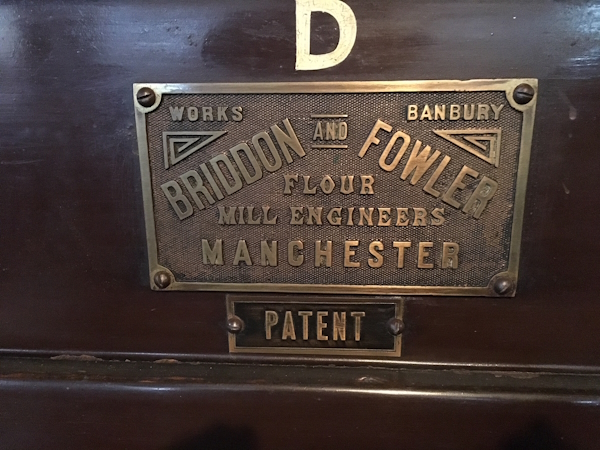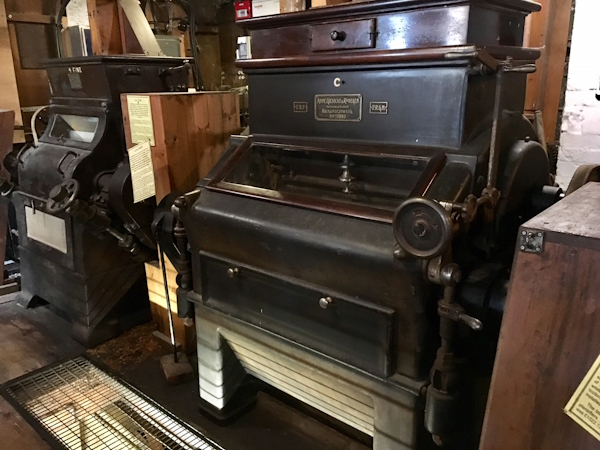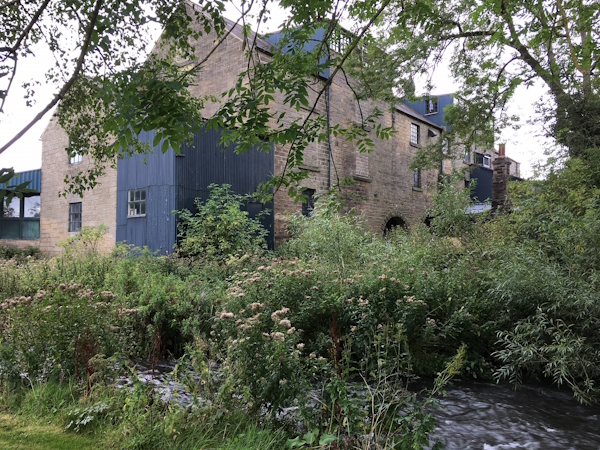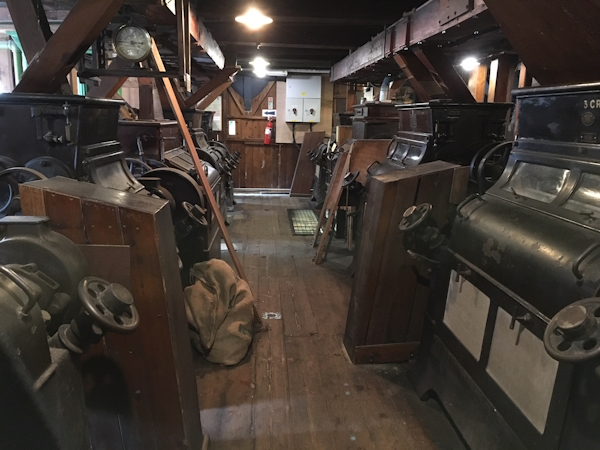Caudwell’s Mill, Rowsley
Rowsley in Derbyshire is a small village that has flourished given its location where the River Wye flows into the River Derwent. This has made it an ideal location for watermills, including one particular mill owned by the Caudwell family. The history of this country mill on the River Wye is the topic of the Caudwell’s Mill Collection, held here at the archive, and this article:
John Caudwell
The beginning of the history of the Caudwell family and this mill began in 1874 when John Caudwell leased a corn mill from the Duke of Rutland. Once he had rights to the property, he built a new structure, a watermill, costing him £7000. Whilst this structure would help revitalise the mill, it was the machinery that would make a greater impact. The family had been milling there less than ten years when it became apparent that water power and stones were not the future with the impact of the roller milling revolution beginning to be felt. So it was that in 1885, Thornton’s of Rutford re-equipped the mill with roller machinery, for £2,700, and in 1887, a 40 inch diameter ‘Trent’ turbine, made by C. L. Hett of Brigg, was installed.
As necessary as this machinery was to their flour milling industry, it came at a cost. This was an actual monetary cost as when John Caudwell died in 1891 he left many debts. However, his many children succeeded in running the mill without him, as they had been doing in the years before his death.
John Caudwell had at least seven children, four sons: Charles, Edward, Francis and Walter, and three daughters, Mary, Elizabeth, and Ellen. The four sons entered into a partnership at Rowsley Mill whilst their father was ‘trustee of the said tenancy for his three daughter’ (CAUD-06913). This partnership was under the name of Charles and Edward Caudwell and Co. and it saw quick success with an expansion in 1895, when the brothers took over King’s Mill near Mansfield, and then buying out their sisters’ share of Rowsley Mill in 1897.
However, this partnership was not destined to last. It ended in 1899 and the brothers went their separate ways: Charles moved to a mill in Congleton; Edward and Francis continued in partnership at King’s Mill whilst Edward took over the sole running of Rowsley Mill forming Edward Caudwell (Rowsley) Ltd.
Edward Caudwell (Rowsley) Ltd.

In sole control of the mill, Edward Caudwell was lauded for the improvements he bought to the mill, such as hiring Briddon & Fowler to install a 65 h.p. gas engine in 1905. He then rehired them a few years later to install the “Alphega” system of scalping and any other advancements that were needed. When representatives of The Miller visited his mill shortly after these installations, Edward Caudwell and his mill were both highly praised:
‘Mr. Caudwell has one of the cleanest mills we have ever seen, and it reflects great credit upon him and upon the engineers who designed and planned the installation….’
‘Mr Caudwell is a kindred spirit and a born miller. He loves his mill, and he aims at having and producing the best that can be got.
We like to meet this class of man, and we trust that many others of the smaller fraternity will follow his example, so that their trade position may be made unassailable.
We tender our hearty thanks to Mr Caudwell for allowing us free access to every part of his mill and for his hospitality, and our obligations are also due to Mr. Briddon and Mr. Fowler, both of whom were most attentive and courteous.’ (‘A Visit to Rowsley Mills’, The Miller, 2 September 1907).

So the work of Briddon & Fowler and the endeavour of Edward Caudwell were both praised. Yet this was not the end of the improvements added to the mill. In 1914 the German Company Amme, Giesecke & Konegan (AGK) were hired to install a new roller mill, Ageka plansifters and a Francis twin turbine. Unfortunately, the men who had come over to install the machinery were still present in Great Britain when war was declared on Germany in August 1914 and they found themselves interred for the duration of the war on the Isle of Man.
The next company used to install machinery in the mill, Henry Simon Ltd., also had a German link as Henry Simon himself originally came from Germany. They were hired to replace different pieces of equipment, including the purifiers, in the 1930s. The expenditure of money to ensure the best machinery was in use and that the process was efficient ensured the success of the mill for many years.
Centenary Celebrations

Indeed, the mill was successful for so long that in 1974, the centenary of the mill under the Caudwell’s was celebrated. By this time the mill was being run by Edward Caudwell’s son, Sandy Caudwell. In the booklet published to celebrate this centenary, Caudwells of Rowsley: Flour Millers, there was a note of concern over the future of the mill alongside some hope:
‘The milling industry is confronted by everchanging problems in the feeding of humans, and, of course, of animals which are equally the miller’s concern. Animal feeding has recently become much more an exact science. With the cost of grain, a basic ingredient, already soaring, the shortage of fish meal and other constituents had aggravated an already serious situation. Each shortage tends to precipitate a further shortage and yet another replacement constituent. The implications of this for the future are a cause for concern. At present it is difficult to foresee the future. In so many spheres of life the trend appears to be towards vast business concerns, yet there always seems to be room for the small business and it appears that milling is no exception. In this day of high pressure selling and soaring overheads, using more natural resources than most companies in this county. We have a first-class staff who work together as a team. We therefore look forward to the future with some confidence’.
Closure and Preservation
Unfortunately, this confidence in the future was unfounded as three years after this was published, there were plans to close the mill. Although the closure ended the Caudwell family’s direct link to the mill, it still retained their name as the mill was known as Caudwell’s Mill. This name could be preserved as local organisations, mainly the Peak Park Joint Planning Board (PPJPB), expressed interest in preserving mill.

In 1980 the Caudwell Mill Trust Ltd. was formed with the object of: ‘conservation, maintenance and use of Caudwell’s Mill…for the benefit of the public’ (Walker, p.2). They acquired a 51 year lease and appointed a full time manager, Mike Tilley. The next years would see them face challenges with money and issues with the structure itself, such as the roof. Nevertheless, despite these obstacles, the milling of wholemeal flour restarted in 1982 and is still continuing.
Caudwell’s Mill is open today and visitors are welcomed. The shop sells a range of flours made at the mill and it seeks to still be milling two hundred years after John Caudwell first leased the mill.
The Collection
Caudwell’s Mill Collection held here at the archive is predominantly made up of documents relating to the Preservation of the Mill and the actions of the Caudwell Mill Trust Ltd. This includes details about the machinery as well as an in-depth description of the preservation process. Earlier documents, such as the agreement of the partnership between the four sons and an Indenture about the brothers buying out their sisters, are also included. There are no images in this collection so the photographs used in this article were taken by Mildred Cookson when she visited the mill in 2017. This story shows the success of preservation and the endurance of this mill to still be working over a hundred years after it was first built. The mill and the name of the Caudwell family lives on through the mill and the Collection.
Sources:
‘A Visit to Rowsley Mills’, The Miller, 2 September, 1907.
Caudwells of Rowsley: Flour Millers (Derbyshire, 1974).
Indenture: CAUD-06913.
Partners: CAUD-06912.
Saving the Mill: CAUD-06911.
Walker, Graeme, The Saving of Caudwell’s Mill, Rowsley (2002): CAUD-06911.

